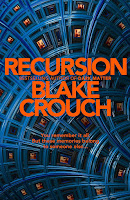Book Review: Recursion
From the author of Dark Matter comes a cerebral, feverish thriller about time travel and shifting reality. Memory is the hinge on which Recursion's mind-bending twists pivot, turning the narrative into a puzzle box — a meticulous work that expertly walks the line between carefully constructed labyrinths and cinematic spectacle. Thus when Recursion kicks off in November 2018, the "real" story has already been set in motion. NYPD detective Barry Sutton unsuccessfully attempts to talk a woman out of jumping from a 40-storey building, only to learn that she is suffering from False Memory Syndrome, a neurological disease where the afflicted recall vivid memories of lives they never lived, leading the sufferers to experience a dissonance that drives them to take their own lives. A troubled Barry, having separated from his wife post the death of their daughter Meghan 10 years ago, sets out on a journey to investigate, uncovering truths in the process that sends his reality on a collision course with a sinister force from the past. Crouch stipulates a clear set of rules under which his "fictional world" operates and sticks with it, even as the story rockets across multiple timelines spanning several decades, while effortlessly integrating philosophical themes of identity (are you really you if your memories are recalibrated to the point of leading an entirely different life?), the apocalyptic consequences of unchecked power, and what it takes to be human. It's as much a poignant love story with a beating core as it's speculative fiction at its finest.
P.S.: Quotable quote — "If memory is unreliable, if the past and the present can simply change without warning, then fact and truth will cease to exist. How do we live in a world like that?"
P.S.: Quotable quote — "If memory is unreliable, if the past and the present can simply change without warning, then fact and truth will cease to exist. How do we live in a world like that?"


Comments
Post a Comment